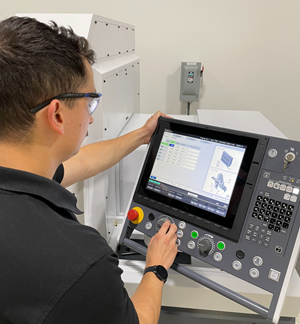Data from a Machine-Monitoring System Can Help Human Resource Management
Advanced Machining used FactoryWiz from Refresh Your Memory Inc. to go from simply buying more equipment when facing production constraints to becoming more efficient with machine monitoring.
Share




As a supplier of machine monitoring software, we find that customers are primarily preoccupied with concerns over machine performance and utilization. This is why overall equipment effectiveness (OEE) is a popular measure of shopfloor activities. Most dashboards showing production results include OEE ratings, at least as an option.
However, the productivity (and profitability) of a machining operation has as much to do with human behavior, especially how well machine operators are performing their duties to keep machines running and jobs on schedule.
The data from some machine monitoring systems can also help a machining company enhance the contribution of shopfloor personnel in the productivity equation. In fact, this data can be a valuable tool for many human resource (HR) functions such as conducting employee performance reviews, managing incentive programs, setting goals and identifying training needs. Just as data gathered by a computer network from connected machines can lead to better decisions about a manufacturing process when that data is analyzed and reported effectively, this data can also lead to better decisions about engaging and motivating a workforce. Implementing a machine monitoring system makes performance measurable, objective and visible. The same characteristics apply to the study of operator performance—its basis can now be measurable, objective and visible.
S. Scott Shortess, the COO of Advanced Machining, a 55-person job shop in Owasso, Oklahoma, is a FactoryWiz Monitoring user whose experiences in this area are particularly telling.
“At first, we were interested in machine monitoring because we tended to respond to production constraints by simply buying more equipment, but our profit picture wasn’t getting any better,” he says. “We needed more efficiency, not more machines. With the monitoring system in place, we could see where downtime, planned or unplanned, was really hurting us. We found kinks in our workflow and started straightening them out. We could also see how much operator behavior had to do with machine output.”
This led Advanced Machining to take a two-pronged approach to making effective use of the data from machine monitoring. One was a renewed focus on process improvements, especially as a result of more precisely targeted lean manufacturing techniques such as setup reduction and “next job readiness.” The other prong was making the shop’s profit-sharing incentive program more effective. Mr. Shortess says that data-driven performance reviews and corresponding payout policies were a big part of this effort. Here are some additional observations and advice he has to offer:
- Build benchmarks and set goals around attainable improvements linked to customer, company and personal benefits. Your good decisions help everyone and maximize rewards.
- Foster dialogue and keep it positive. How can we work together to help you do better where the facts show room for improvement?
- Use data to ask the right questions and get the real reasons for shortcomings. Good data protects everyone and defuses the blame game.
- Let shopfloor visibility generate some healthy competition among employees. Keeping score should reflect that everybody can win.
- Shops should think about the HR benefit when evaluating machine monitoring, but it is okay to focus on improving OEE first. Just don’t forget about it! And keep HR people in the loop.
- Don’t let data-driven incentive programs get stale. Review goals and adjust the performance targets often. Your machine-monitoring supplier should be able to help you tweak reports for this.
Mr. Shortess also acknowledges that a system set up to help employees succeed doesn’t guarantee that all of them will. “Letting an employee go is one of the toughest decisions any manager has to make. Data from a monitoring system helps us spot that things are not going in the right direction, guides us in efforts to turn things around, but also sets an endpoint if it comes to that,” he says.”
Related Content
Manufacturer, Integrator, Software Developer: Wolfram Manufacturing is a Triple Threat
Wolfram Manufacturing showcased its new facility, which houses its machine shop along with space for its work as a provider of its own machine monitoring software and as an integrator for Caron Engineering.
Read MoreProtecting Your Automation Investments
Shops need to look at their people, processes and technology to get the most of out their automation systems.
Read MoreEasy-To-Install Data Acquisition System for Real-Time Monitoring Across Brands
cnSEE from All World Machinery Supply combines easy installation and monitoring across multiple machines.
Read MoreSwiss-Type Control Uses CNC Data to Improve Efficiency
Advanced controls for Swiss-type CNC lathes uses machine data to prevent tool collisions, saving setup time and scrap costs.
Read MoreRead Next
Building Out a Foundation for Student Machinists
Autodesk and Haas have teamed up to produce an introductory course for students that covers the basics of CAD, CAM and CNC while providing them with a portfolio part.
Read MoreSetting Up the Building Blocks for a Digital Factory
Woodward Inc. spent over a year developing an API to connect machines to its digital factory. Caron Engineering’s MiConnect has cut most of this process while also granting the shop greater access to machine information.
Read More5 Rules of Thumb for Buying CNC Machine Tools
Use these tips to carefully plan your machine tool purchases and to avoid regretting your decision later.
Read More


















.jpg;maxWidth=300;quality=90)












